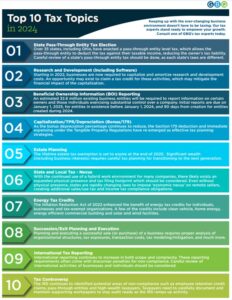With the new year comes new tax topics for businesses and individuals, but keeping up with the ever-changing business environment doesn’t have to be taxing! Below are the top 10 tax topics we’re keeping an eye on.
-
- State Pass-Through Entity Tax Election:
 Over 35 states, including Ohio, have enacted a pass-through entity level tax, which allows the pass-through entity to deduct the tax against their taxable income, reducing the owner’s tax liability. Careful review of a state’s pass-through entity tax should be done, as each state’s laws differ.
Over 35 states, including Ohio, have enacted a pass-through entity level tax, which allows the pass-through entity to deduct the tax against their taxable income, reducing the owner’s tax liability. Careful review of a state’s pass-through entity tax should be done, as each state’s laws differ. - Research and Development (including Software): Starting in 2022, businesses are now required to capitalize and amortize research and development costs. An opportunity may exist to claim a tax credit for these activities, mitigating the capitalization’s financial impact.
- Beneficial Ownership Information (BOI) Reporting: An estimated 32.6 million existing business entities will be required to report information on certain owners and those individuals exercising substantial control over a company. Initial reports are due on January 1, 2025, for entities in existence before January 1, 2024, and 90 days from creation for entities created during 2024.
- Capitalization/TPR/Depreciation (Bonus/179): As the bonus depreciation percentage continues to reduce, the Section 179 deduction and immediate expensing under the Tangible Property Regulations have re-emerged as effective tax planning strategies.
- Estate Planning: The lifetime estate tax exemption is set to expire at the end of 2025. Significant wealth (including business interests) requires careful tax planning for transitioning to the next generation.
- State and Local Tax – Nexus: With the continued use of a hybrid work environment for many companies, an expanded physical presence and tax filing footprint likely exists and should be considered. Even without physical presence, states are rapidly changing laws to impose ‘economic nexus’ on remote sellers, creating additional sales/use tax and income tax compliance obligations.
- Energy Tax Credits: The Inflation Reduction Act of 2022 enhanced the benefit of energy tax credits for individuals, businesses and tax-exempt organizations. A few of the credits include clean vehicle, home energy, energy-efficient commercial building and solar and wind facilities.
- Succession/Exit Planning and Execution: Planning and executing a successful sale (or purchase) of a business requires proper analysis of organizational structures, tax exposures, transaction costs, tax modeling/mitigation, and much more.
- International Tax Reporting: International reporting continues to increase in both scope and complexity. These reporting requirements often come with draconian penalties for non-compliance. Careful review of international activities of businesses and individuals should be considered.
- Tax Controversy: The IRS continues to identify potential areas of non-compliance, such as employee retention credit claims, pass-through entities and high-wealth taxpayers. Taxpayers must carefully document and maintain supporting workpapers to stay audit-ready as the IRS ramps up activity.
- State Pass-Through Entity Tax Election:
Our tax experts stand ready to empower growth. Contact GBQ today.
Share via email
« Back
Print
